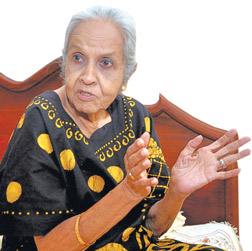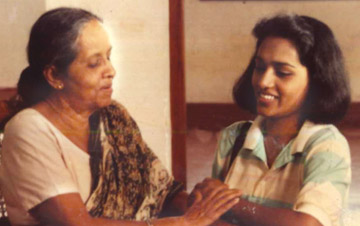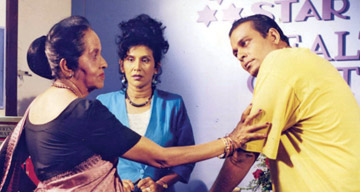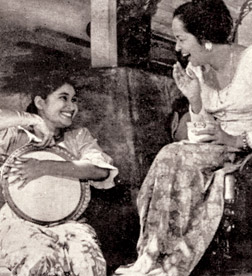|

Evergreen & ever loved
Ruwini JAYAWARDANA
There are millions of questions one would want to ask Irangani
Serasinghe, a name that brings to mind the image of a quintessentially
affectionate mother or grandmother. Compassion, prudence and dignity are
words synonymous with her character. She is many characters in one who
has given a number of unforgettable roles to the cinema, theatre and the
small screen. Rekava carved her line of destiny. She later portrayed
several significant roles in Delovak Athara, Bakmaha Deegay, Kinihiriya
Mal, Yashorawaya, Doo Daruwo and Doowaru.
The thousands of ideas waiting to burst out of her head and shared
with those around her deceives the silent serenity and composure on her
face in front of strangers. Once triggered, however, our 'Encounter of
the Week' is full of stories, ideas and little quips about her projects
and social outlook.
 |
|
Environment activist and seasoned
actress Irangani Serasinghe. Picture by Wasitha Patabandige |
Q: You are English educated. Therefore Sinhala is a second
language for you. However your profession demands you to mostly
cooperate in Sinhala.
A: I was born and bred in the village. Once I started going to
school and was boarded, we communicated entirely in English. Therefore
Sinhala became a second language.
However when we went home for the holidays, we conversed with the
other villagers in Sinhala. Therefore it was not an entirely an alien
language for me. However I did have a few problems understanding
literary Sinhala. Even today when I listen to the news or read a
newspaper I have difficulties understanding certain terms.
I can manage everyday language but not if I want to stress on
something complex. Then it is very frustrating because I do not know the
exact words to use. Sometimes there are words in the scripts which need
explanation. I realize that if I knew Sinhala it would be very much
easier for me.
Q: You studied acting at the Bristol Old Vic Theatre School
and Central School of Speech Training and Dramatic Art in UK. How
important has that experience been in shaping your career?
A: It helped a great deal. Professor Ludowyek advised me to go
to a drama school. I was astounded because I did not know there was
anything to learn about drama. It was only when I went there that I
realized that there is a lot to learn than merely stepping on stage and
getting into the skin of a character.
It is a great shame that there isn't a state drama school to train
young artistes. A few artistes like Somalatha Subasinghe have started
training schools. That is good because that means that there is some
form of training but that is not sufficient. The full course that I did
for theatre took four years. A lot of attention is paid to speech
because you have to make yourself heard to the audience in the last row.
You maybe a very talented person but every art embodies techniques.
You need to learn that. If you are a pianist your fingers need to be
supple. You have to learn how to handle the bow. Similarly a dancer has
to learn the steps and train his or her body on how to move. Likewise an
actor addresses the audience with his or her voice and body. Those two
are your instruments. Therefore you have to prefect these two aspects.
The training of the mind is important as well. You need to develop
sensitivity.
Q: Why do you name theatre as your first love?
 |
|
In Doo
Daruwo |
 |
|
In
Kinihiriya Mal |
A: You act right through the play from start to finish but in
a teledrama or film you can start at the end or from the middle. There
is no flow. You have many close ups and there are these tiny details
which you have to alter. It is like turning a tap on and off.
I was used to building up a whole background for the character while
performing in theatre. That is how you build that role. In TV and cinema
you have to plunge into the role at once. Sometimes you have to play
highly emotional scenes over and over again if the take does not come
out right. It is not easy.
Q: Most people see you as 'Mother or Grandmother No 1' in the
industry.
A: True, I was mostly a mother and now a grandmother but the
roles were in different situations and had different kinds of
relationships with other characters. However there were a few instances
in projects like Sandeshaya where I did a different role, a character of
a spy!
Bakmaha Deegay is of a different style. People were horrified by my
portrayal in Kinihiriya Mal. They even asked me why I took on such a
role.
I informed that an artiste likes to have variety in their roles to
prove that you are able to play such characters and to derive a sense of
pleasure from your performance.
The public are delighted by some role you play and they like to see
you in that particular mould.
Q: Dulsi Nona in Doo Daruwo is evergreen. What made her so?
A: I used to think that it is not me but it is the problems
that she has which are common to thousands of people in the society.
They identified themselves with that mother. That drew them towards
her.
Q: How different is your role in Doowaru?
A: It is quite a complicated role. My character evokes comedy
because she reacts to drumming. She is also a far thinking grandmother
and a mother who pretends to herself that her children wants her.
A mother has become a useful tool in the society. It is a pathetic
situation. I understand Nalaka's way of doing thing and his demands. It
is very comfortable to work with him and now we have become friends.
Q: You are not among the jury in any of the popular reality
television shows on TV.
 |
|
In Bakmaha
Deegay |
A: I do not believe in competition, especially in the arts
field. Reality television prorammes are driving us to become more and
more competitive. Every child is not a born dancer or singer but the
mothers drive children to compete in the event. They do not project the
attitude that this is just a game. This attitude is even found in
schools where children are driven to do harmful deeds to children who
are better than them in certain subjects when we should be talking about
cooperation.
Q: You harbour a love for environmental conservation. You are
also the pioneer of Ruk Rakaganno (Protectors of the Trees). What
brought on this passion?
A: My passion is the natural environment. Conservation of
natural resources is immensely important for the survival of Sri Lanka
as well as the world. We are so negligent about this fact. We have
destroyed many things throughout the ages.
I wish I knew Sinhala better because then I could talk to people
about saving the environment in a more effective manner. I learnt all
the terms connected with the subject and try to do my best to send home
the message. I was born in Ruwanwella which comprises beautiful sand
dunes. Now the beauty is destroyed because of sand mining. You cannot
walk on the beach without tiny stones pricking your feet. The bottom of
the river holds rocks and mud instead of sand. The river had come crept
closer to the road. We are also looking after an arboretum in Dambulla
which was started by Sam Popham, an English planter. He did not engage
in plantation but took out all the trees which were not natural to that
area. We have creatures like the loris living in that area. Anyone who
wants to know about the vegetation of that area and the creatures can
visit the site.
I am also involved with the Jetwing JEEP programme which contributes
to minimize global warming. They protect a 100-acre Analogue Forestation
site located at Jetwing Hunas Falls and create awareness among
schoolchildren. |



